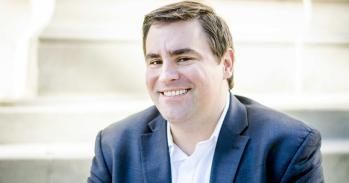
An international symposium at Singapore’s CREATE campus highlights the global challenges of sustainable energy and suggests innovative ways of reducing industry’s carbon footprint
An international symposium at Singapore’s CREATE campus highlights the global challenges of sustainable energy and suggests innovative ways of reducing industry’s carbon footprint
We want to do first-class research. We want to understand the world better. And we want to contribute to some of the pressing problems facing mankind – in particular, global warming.
Markus Kraft, Director of CARES
The Campus for Research Excellence and Technological Enterprise (CREATE) was established in 2007, with funding from Singapore’s National Research Foundation (NRF), to allow research-intensive institutions from all over the world to set up research centres in Singapore and establish research partnerships with local universities.
Today, CREATE supports collaborations between four Singaporean universities – the National University of Singapore (NUS), the Nanyang Technological University (NTU), the Singapore University of Technology and Design (SUTD) and the Singapore Management University (SMU) – and seven international partners – ETH Zurich, Massachusetts Institute of Technology, Technical University of Munich, Hebrew University of Jerusalem, University of California, Berkeley, Shanghai Jiao Tong University and the University of Cambridge.
To mark its 10th anniversary, CREATE held an international symposium attended by university leaders as well as Singapore's former president, Dr Tony Tan.
Speaking at the event on 1 December, Mr Heng Swee Keat, Singapore’s Minister for Finance and Deputy Chairman of the NRF said:
“We designed CREATE to encourage interaction not just across a range of disciplines and cultures, but also of perspectives – from dreamers to researchers, designers and users – thereby fuelling exchanges between the spheres of research and innovation.”
“By bringing together researchers, policy makers and end users, CREATE enables serendipitous interactions and discovery. It creates a research environment that is richer than the sum of its parts, allowing researchers to innovate and provide solutions to real world problems.”
“Today,” he added, “CREATE is an international research hub, built on strong institutional partnerships, involving almost 1,100 people from over 40 countries. CREATE’s projects are relevant to Singapore and impactful on the global level.”
CARES: a hub for research collaboration
The Centre for Advanced Research and Education in Singapore (CARES), a wholly-owned subsidiary of the University of Cambridge, was set up as one of CREATE’s collaborative initiatives in April 2013. It hosts a number of research collaborations between the University of Cambridge, NTU, NUS and industrial partners in Singapore and elsewhere.
Representing CARES at the event, its Director, Prof. Markus Kraft, explained: “CARES creates and fosters cutting-edge science in the area of energy efficiency in chemical technologies. We want to do first class research, world-leading research. We want to understand the world better. And we want to contribute to some of the pressing problems facing mankind – in particular, global warming."
Prof. Gehan Amaratunga, Professor of Engineering at the University of Cambridge, was involved in CARES from its inception: “CARES is driven by the Cambridge attitude to research: to think about things deeply, and to deliver results that are significant and worthwhile. But that is coupled with the Singapore culture of hard work, and results-driven research. The mixture of those two research cultures under the CARES umbrella generates a unique symbiosis.”
He adds: “It is worth noting that CARES was the first time that the University of Cambridge had established anything under its name outside of Cambridge. The Singaporean government has put resources into research, and is keen for international researchers to come and work in Singapore. From the Cambridge perspective, it gives us an opportunity to globalise our research by engaging in a location that is an Asian hub, directly in between Asia’s two largest population centres – India and China. Singapore is a melting pot where researchers from the entire region are present. The impact of what we do in Singapore will be felt all over Asia.”
Reducing carbon footprint and energy demand
CARES’ first research programme is the Cambridge Centre for Carbon Reduction in Chemical Technology (C4T), a partnership between Cambridge and Singapore set up in 2013 to tackle the problem of assessing and reducing the carbon footprint of the petrochemical plants and electrical network on Singapore’s Jurong Island. Since its inception, it has brought together researchers in fields including Chemical Engineering, Biotechnology, Chemistry, Biochemistry, Information Engineering, Electrical Engineering and Materials Science and Metallurgy.
Lowering the cost of CO₂ capture and developing technologies for waste heat utilisation have been among the main drivers for C4T’s research. It addresses the problem of carbon abatement in chemical technologies though Interdisciplinary Research Programmes that combine state-of-the-art experimental analysis with advanced modelling research.
Speaking at CREATE’s 10th anniversary event in Singapore, Dr Lim Mei Qi, Project Officer for CARES, explained: “C4T proposes ways of reducing the carbon footprint of Singapore while supporting economic growth. To build upon CARES’ early success we will continue to engage with Singapore's stakeholders, including government agencies, policymakers, and academic and industrial research organisations. We hope, by doing so, to positively contribute to Singapore’s ratification of the Paris Agreement on climate change.”
A laboratory built from scratch – via Skype
Dr Jethro Akroyd, Senior Research Associate in the Department of Chemical Engineering and Biotechnology’s Computational Modelling Group, worked on the design of the CARES laboratory in Singapore.
Today he spends most of his time supervising CARES students based in Cambridge, but he remembers the early challenges of designing lab space remotely: “We communicated with the architects and our external consultant in Singapore via Skype. We often had Skype meetings at 5:30 in the morning – the only time people were available both in Singapore and in Cambridge. Those were long days.”
“One of the biggest difficulties was explaining to people in Singapore what was required in the laboratories in order to deliver flexible research space. And even once we figured out what we wanted, we had to work out how to fit this into the physical constraints of the space that was available at CREATE. Imagine sitting in a small, cold room on a dark Cambridge morning trying to explain complicated ideas to a team on the other side of the world who can only see you via a video link.”
“We built up a very successful working relationship with the consultant and the architects. This culminated in my first visit to Singapore, during the design process, when we had our first face-to-face meeting as a team. That was very special.”
“It’s been great to see designs you worked out on paper in reality, and you can see how the research space was going to be used in order to understand the fundamental combustion and pollutant formation processes that are really at the heart of our role in the research project.”
In June 2017, the CARES C4T Laboratory was awarded the BCA Green Mark for Laboratories Platinum Award, in recognition of its sustainable efforts and commitment to reduce the environmental impact of lab operations.
An industrial park simulator
CARES C4T’s flagship project is the J-Park Simulator (JPS) – a tool for the design, analysis and operation optimisation of eco-industrial parks developed by C4T researchers. It aims to allow sector agencies, industry and infrastructure providers to model the impact of different “what-if” scenarios in real time. The simulator is able to analyse different scenarios affecting chemical processes, electricity grid and building management to provide the visual information needed to support optimisation, decision-making and scenario analysis.
“In order to reach an optimum symbiotic relationship among industries and networks, all resources need to be taken into consideration simultaneously – this is the idea behind J-Park Simulator," explained Dr Lim.
Split-site PhD
Another successful initiative has been the Cambridge-CARES studentship programme, which allows Cambridge PhD students to spend two years based in Singapore with the C4T team.
Jacob Martin is a third-year PhD student at CARES currently doing research into how to stop soot from forming in engines.
“Something that I like about CARES is being able to work with a lot of different people from different universities. Because we are physically located within the CREATE tower, it is easier to interact with other universities and do a lot of research with other interest groups. And because we have access to NUS’ equipment, we can expand what we are doing in Cambridge. The availability of resources has been a real selling point for the programme.”
He cites the Visiting Scientists scheme as helping to establish international research connections. This invitation-only programme attracts eminent professors from around the globe, such as Emeritus Professor Karl Johan Åström from the Department of Automatic Control, LTH, Lund University, to stay and work with C4T researchers in Singapore for a few weeks.
Jacob hopes that his research will lead to new technologies to reduce pollution from diesel engines, which has an impact on climate as well as on human health.
“It always helps to have more connections in research. Being at CARES will definitely be helpful to establish collaborations not only in Asia but also with universities in America. There are many benefits to collaboration. You can achieve a lot more. The more minds you put to a problem, the faster you can solve it.”
He adds: “Having people with different cultural backgrounds allows for new and interesting solutions to problems. Cambridge has a particular way of dealing with problems – focus, focus, focus, and really nail the fundamentals. Sometimes that means you lose a bit of perspective. Something that’s been really good about collaborating with people in Singapore is that it’s less about the minutiae and more about the big picture. Singapore is facing a lot of big problems to do with climate change, energy, water. It’s small enough that you can make big changes, and use it as a model for other cities all over the world.”
Teaming up
CREATE makes this collaboration possible by supporting projects through the Intra-CREATE programme. A recent example is the three-year project involving researchers from the University of Cambridge, the University of California, Berkeley, the National University of Singapore (NUS) and Nanyang Technological University (NTU), which was recently awarded SGD$5m (£2.8m) by Singapore’s National Research Foundation.
The project, which will start in January 2018, seeks to develop ways of transforming carbon dioxide (CO₂) emitted as part of the industrial process into compounds that are useful in the chemical industry supply chain. It will be co-led by Prof. Alexei Lapkin (University of Cambridge/CARES) and Prof. Joel Ager (UC-Berkeley and Berkeley Education Alliance for Research in Singapore (BEARS Ltd)).
Looking ahead
After a successful start, CARES is now taking stock of the knowledge created over the past four years and planning for its next phase.
Prof Markus Kraft (CARES' Director) commented: “We have identified opportunities to save over eight million tonnes of CO₂ per year for Singapore – this is about 20% of their annual emissions. The idea of C4T Phase 2 is to take this forward. At the core of the proposal for C4T Phase Two is to look at ideas generated in Phase One, take them much closer to the market and let them be adopted by industry.”
“One of the ideas we developed in Phase One was to blend biodiesel with diesel fuel for road transport. We’ve shown this can save about one million tonnes per year of CO₂ for Singapore. What we’re now looking at in Phase Two is whether we can do anything similar for marine shipping traffic. This has the potential to save something like another one million tonnes of CO₂ in Singapore, but it also has the potential to be adopted worldwide. This could have a much broader global impact, far beyond just the shipping in Singapore Strait.”
For further information on CARES and the C4T research programme please contact Ms Louise Renwick, CARES Communications and External Affairs Executive, caresco@hermes.cam.ac.uk,; Tel: +6566015447

The text in this work is licensed under a Creative Commons Attribution 4.0 International License. For image use please see separate credits above.




